Nsg 5003 week 2 test - Study guides, Class notes & Summaries
Looking for the best study guides, study notes and summaries about Nsg 5003 week 2 test? On this page you'll find 58 study documents about Nsg 5003 week 2 test.
Page 4 out of 58 results
Sort by
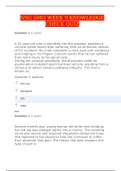
-
NSG 5003 WEEK 9 KNOWLEDGE CHECK QUIZ & WEEK 10 KNOWLEDGE CHECK
- Exam (elaborations) • 20 pages • 2021
-
- $17.99
- + learn more
NSG 5003 WEEK 9 KNOWLEDGE CHECK QUIZ Question 1 (1 point) A 52-year-old man is admitted into the hospital, awaiting a cervical spinal fusion after suffering from an all-terrain vehicle (ATV) accident. His chief complaint is neck pain and numbness and tingling in his fingers. Concern exists that he has suffered from some injury to his spinal cord. During the surgical procedure, the physicians order an examination to detect electrical brain activity resulting from a stimulus to detect se...
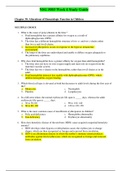
-
NSG 5003 Week 4 Study Guide - Chapter 30 -32
- Exam (elaborations) • 16 pages • 2021
- Available in package deal
-
- $20.49
- + learn more
NSG 5003 Week 4 Study Guide Chapter 30: Alterations of Hematologic Function in Children MULTIPLE CHOICE 1. What is the cause of polycythemia in the fetus? 2. Why does fetal hemoglobin have a greater affinity for oxygen than adult hemoglobin? 3. Which blood cell type is elevated at birth but decreases to adult levels during the first year of life? 4. In a full-term infant, the normal erythrocyte life span is _____ days, whereas the adult erythrocyte life span is _____ ...
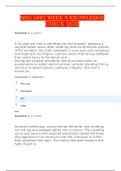
-
NSG 5003 WEEK 9 & WEEK 10 KNOWLEDGE CHECK(UPDATE)
- Exam (elaborations) • 20 pages • 2021
-
- $17.39
- + learn more
NSG 5003 WEEK 9 KNOWLEDGE CHECK QUIZ Question 1 (1 point) A 52-year-old man is admitted into the hospital, awaiting a cervical spinal fusion after suffering from an all-terrain vehicle (ATV) accident. His chief complaint is neck pain and numbness and tingling in his fingers. Concern exists that he has suffered from some injury to his spinal cord. During the surgical procedure, the physicians order an examination to detect electrical brain activity resulting from a stimulus to detect se...
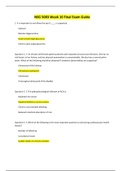
-
NSG 5003 Week 10 Final Exam Guide (193 Questions with Correct Answers) Guaranteed A Grade
- Exam (elaborations) • 53 pages • 2021
- Available in package deal
-
- $25.49
- + learn more
NSG 5003 Week 10 Final Exam Guide 1. It is important to not dilate the eye if ____ is suspected. Question 2. 2. An 18-year-old female patient presents with repeated urinary tract infections. She has no risk factors in her history, and her physical examination is unremarkable. She also has a normal pelvic exam. Which of the following should be obtained if anatomic abnormalities are suspected? Question 3. 3. The pathophysiological hallmark of ACD is: Question 4. 4. Which of the followin...
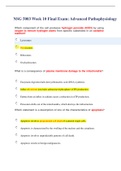
-
NSG 5003 Week 10 Final Exam: Advanced Pathophysiology
- Exam (elaborations) • 18 pages • 2021
- Available in package deal
-
- $15.99
- + learn more
NSG 5003 Week 10 Final Exam: Advanced Pathophysiology Which component of the cell produces hydrogen peroxide (H2O2) by using oxygen to remove hydrogen atoms from specific substrates in an oxidative reaction? What is a consequence of plasma membrane damage to the mitochondria? Which statement is a description of one of the characteristics of apoptosis? During cell injury caused by hypoxia, sodium and water move into the cell because: What is an effect of ionizing radiation exposure? options: chap...
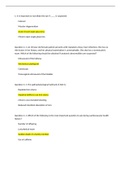
-
NSG 5003 Week 11 Final Exam 2.100% correct
- Exam (elaborations) • 53 pages • 2021
-
- $43.49
- + learn more
NSG 5003 Final Exam 1. It is important to not dilate the eye if ____ is suspected. 2. An 18-year-old female patient presents with repeated urinary tract infections. She has no risk factors in her history, and her physical examination is unremarkable. She also has a normal pelvic exam. Which of the following should be obtained if anatomic abnormalities are suspected? 3. The pathophysiological hallmark of ACD is: 4. Which of the following is the most important...
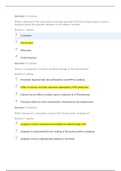
-
NSG 5003 FINAL EXAM.LATEST UPDATE
- Exam (elaborations) • 19 pages • 2020
- Available in package deal
-
- $19.49
- 3x sold
- + learn more
NSG 5003 Final Exam Week 10: Advanced Pathophysiology: Which component of the cell produces hydrogen peroxide (H2O2) by using oxygen to remove hydrogen atoms from specific substrates in an oxidative reaction? What is a consequence of plasma membrane damage to the mitochondria? Which statement is a description of one of the characteristics of apoptosis? During cell injury caused by hypoxia, sodium and water move into the cell because: What is an effect of ionizing radiation exposure? options: ch...
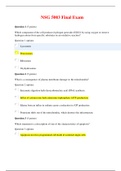
-
NSG 5003 FINAL EXAM / NSG5003 FINAL EXAM (VERSION-1, LATEST- 2020): ADVANCED PATHOPHYSIOLOGY: SOUTH UNIVERSITY |100% CORRECT ANSWERS, DOWNLOAD TO SCORE A|
- Exam (elaborations) • 19 pages • 2020
- Available in package deal
-
- $18.49
- + learn more
NSG5003 Final Exam / NSG 5003 Final Exam: Advanced pathophysiology: South University South University NSG5003 Final Exam / South University NSG 5003 Final Exam Question 1 (5 points) Which component of the cell produces hydrogen peroxide (H2O2) by using oxygen to remove hydrogen atoms from specific substrates in an oxidative reaction? Question 1 options: Lysosomes Peroxisomes Ribosomes Oxyhydrosomes Question 2 (5 points) What is a consequence of plasma membrane damage to the mitocho...
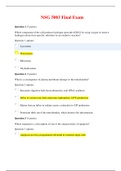
-
SOUTH UNIVERSITY NSG5003 ADVANCED PATHOPHYSIOLOGY FINAL EXAM 2020 (VERSION-1)|100% CORRECT ANSWERS, DOWNLOAD TO SCORE A|
- Exam (elaborations) • 19 pages • 2020
- Available in package deal
-
- $18.49
- + learn more
NSG5003 Final Exam / NSG 5003 Final Exam: Advanced pathophysiology: South University South University NSG5003 Final Exam / South University NSG 5003 Final Exam Question 1 (5 points) Which component of the cell produces hydrogen peroxide (H2O2) by using oxygen to remove hydrogen atoms from specific substrates in an oxidative reaction? Question 1 options: Lysosomes Peroxisomes Ribosomes Oxyhydrosomes Question 2 (5 points) What is a consequence of plasma membrane damage to the mitocho...
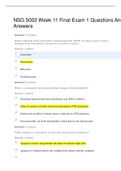
-
NSG 5003 Week 11 Final Exam 1 Questions And Answers
- Exam (elaborations) • 20 pages • 2021
-
- $18.49
- + learn more
NSG 5003 Final: Advanced pathophysiology: South University Question 1 (5 points) Which component of the cell produces hydrogen peroxide (H2O2) by using oxygen to remove hydrogen atoms from spe cific substrates in an oxidative reaction? Question 2 (5 points) What is a consequence of plasma membrane damage to the mitochondria? Question 3 (5 points) Which statement is a description of one of the characteristics of apoptosis? Question 4 (5 points) During cell injury caused by hypoxia, sodium and wat...

How much did you already spend on Stuvia? Imagine there are plenty more of you out there paying for study notes, but this time YOU are the seller. Ka-ching! Discover all about earning on Stuvia


